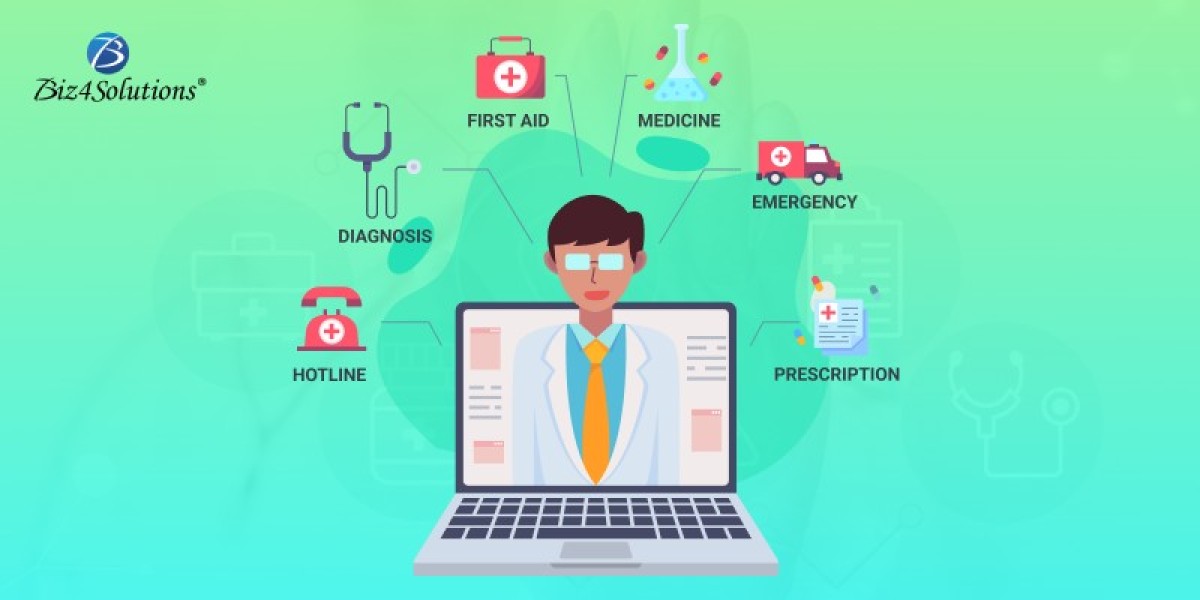Thanks to digital transformation, the healthcare industry has achieved new heights with regard to treatment methodologies and user experiences. The twentieth century was the golden period in terms of achievement in the medical field, thanks to the contribution of advanced technologies. Since then, we have not looked back. From doctors using limited resources for diagnosing a patient to the invention of infusion pumps, dialysis machines, antibiotics, heart valves, and MRI scanners, technology has evolved a lot.
The Healthcare industry is using improved technologies to modernize the healthcare system leading to a wider adoption rate of healthcare software solutions. As researched by Statista, the healthcare industry in the US is expected to generate a revenue of US$17.03 billion in 2023.
Technology in healthcare has improved efficiency, accessibility, accuracy, treatment methodologies, etc. There are several ways technology is transforming the way we approach medical treatment. Let’s explore!
The Transformative Potential of Technologies in Healthcare
Electronic Health Records (EHR)
An EHR is a collection of patient health records that is systematic and digital. They are easy to access and share if you are an authorized user. EHRs may contain a variety of data, including billing information, statistics, medical history, prescription and allergy information, vaccination status, laboratory test results, radiological pictures, and patient’s vital signs. EHRs are used for charting and analyzing patients' data. In the yesteryears, patient records were written on paper and stored in huge, bulky files. As such, there was always a big risk of losing confidential and sensitive patient data. Health-related records stored in EHR systems have successfully mitigated the risks associated with such costly misses.
- Enhanced Research and Public Health Reporting: EHRs can offer a lot of information that can be utilized for research and public health reporting, advancing our knowledge of illnesses and medical outcomes.
- An Improved Standard of Medical Care: Using EHRs, healthcare professionals may track and monitor patient progress, identify areas for improvement, and customize medical treatment plans based on the requirement.
- Savings on Expenses: Due to the increase in efficiency, there will be fewer expenses, which will benefit both the patient and the medical facility.
- Privacy and Security: The usage of EHR ensures privacy and security since all sensitive data is saved in a digital format and only accessible to specific personnel.
- Error-Free Data: Since health data is in digital form with the help of software, the chances of human errors are least likely.
- More Effective Communication: EHR makes it easier for healthcare professionals to communicate with one another regarding health data, enhancing collaboration and allowing for real-time sharing of critical patient data.
Artificial Intelligence in Healthcare:
AI is basically the application of human intelligence and behavior to computers so that they can think and learn like humans. It involves the development of algorithms and computer programs that can perform tasks that typically require human intelligence, such as perception, reasoning, learning, decision-making, and natural language processing. Today, healthcare professionals are leveraging AI for collecting, analyzing, and interpreting humongous data chunks to enhance the accuracy as well as the speed of medical diagnosis.
The Role of AI in Cancer Detection and Treatment: AI helps in cancer diagnosis. For decades, a biopsy was the primary method of diagnosing cancer, but it did not offer a complete image of the organ tissue. Scans of specific organs that get affected by the process of cell mutation are developing into an essential part of histopathology. Today, you can use AI to carry out scans of specific organs for detecting cancer. Medical imaging technologies such as MRI, CT, and PET scans generate vast amounts of image data. This data can be analyzed using AI algorithms to assist in cancer detection and diagnosis. AI-based systems can be trained on large datasets of medical images to identify patterns and features that are associated with cancer. These systems can then be used to analyze new images and identify potentially cancerous lesions or tumors, which can help radiologists and other medical professionals make more accurate diagnoses.
AI has already been used successfully to detect cancer in a variety of organs, including the lungs, prostate, brain, etc. AI-powered imaging tools have shown promising results in improving cancer detection rates and reducing false positives, which can lead to earlier diagnosis and treatment and generate better patient outcomes.
Machine Learning in Medical Treatment
Machine learning, one of the subsets of AI is being used in the healthcare sector to obtain productive outcomes. In this, computers are allowed to learn on their own from examples, without getting programmed by humans. Machine learning can be used for various purposes, such as diagnostics, prognostics, personalized healthcare, drug discovery, electronic health records, and remote patient monitoring. Drug Discovery: ML can assist in drug discovery by analyzing large amounts of data to identify new drugs and predict their effectiveness. ML has contributed immensely to this arena by discovering drugs that humans couldn’t find. There have been certain big breakthroughs by some AI companies, such as Atomwise and Google’s Deermind. Atomwise predicted the development of two drugs that can lessen the impacts of the Ebola virus. DeepMind, which was founded by Google, recently created an AI for breast cancer analysis.
- Medical Imaging: ML algorithms can analyze medical images like X-rays, CT scans, and MRIs to diagnose illnesses like cancer early and more precisely.
- Predictive Analysis: ML may be used to forecast disease outbreaks and other healthcare occurrences such as the likelihood of developing certain medical conditions. This allows practitioners to take precautionary measures and avoid severe health conditions.
- Robot-assisted Surgery: AI-powered surgical robots can aid surgeons with difficult operations, resulting in more precise and less invasive surgeries.
- ML in medicine has the potential to change healthcare services and improve patient outcomes by providing physicians with more accurate diagnoses, personalized treatment plans tailored to a patient’s specific needs and medical history, and a more efficient system of healthcare delivery.
Health Apps and Wearable Devices:
Here’s another example of healthcare technologies that focus on users’ comfort, convenience, and personalization. Healthcare applications and Wearable devices are trending these days and prove immensely helpful to users. Healthcare mobile app development companies have taken over this field by storm by delivering game-changing apps and wearables like smartwatches, smart glasses, etc. Take a look!
Mobile Healthcare Apps
- Medical Reference Apps: These apps provide healthcare professionals with access to a range of medical resources, including drug information, medical calculators, and clinical guidelines.
- Fitness and Wellness Apps: It is important to monitor your health nowadays. Fitness apps exactly do that work for you. These apps provide users with useful information about their bodies and help them track health vitals like physical activity, sleep, calorie intake, nutrition, etc.
- Medication Management Apps: These apps assist patients in managing their prescriptions by reminding them when to take their medications, tracking medication consumption, and offering information on potential side effects of medicines.
- Telemedicine Applications: These apps enable patients to consult with healthcare practitioners via video conferencing and other digital technologies remotely without the need for visiting a medical facility.
- Mental Health Apps: These applications provide medical assistance to persons suffering from mental health challenges. This includes resources and support, such as mindfulness and meditation in general techniques, therapeutic services, and peer support groups.
Overall, mobile apps have the potential to improve patient outcomes and make healthcare more accessible and efficient.
Wearable Devices
Wearable devices are getting more popular day by day as everyone is concerned about their health, thanks to increased public awareness. Because of their capacity to enable real-time monitoring and tracking of numerous health data points, the adoption rate of wearable gadgets is skyrocketing. Here are some examples.
- Fitness Trackers: These devices monitor physical activity, including steps taken, distance traveled, and calories burned. They can also track sleep patterns and provide feedback on overall fitness levels. They give full stats of your daily physical activity. So, it becomes easier to monitor your workout.
- Smartwatches: Smartwatches are the ideal device for health tracking because they are portable and simple to use. They have features like monitoring heart rate, blood pressure, etc. Some models also offer features such as ECG monitoring and fall detection.
- Blood Glucose Monitors: Regular tracking of blood sugar levels is necessary. It can tell you how well your diabetes is controlled. Blood glucose monitors allow individuals with diabetes to monitor their blood glucose levels in real time without having to visit a clinic. These devices provide data that can help in making treatment decisions.
- Medical Alert Systems: These gadgets, which may be worn as a bracelet or pendant, can notify medical personnel of an emergency.
Overall, wearable devices have the potential to transform healthcare by providing real-time monitoring and tracking of various health metrics, improving patient outcomes, and reducing healthcare costs.
Mental Health:
One of the biggest problems in healthcare nowadays is dealing with mental health issues. In the last decade, the number of patients with mental illnesses has increased by around 11%. Exposure to social media and COVID-19 are two of the major reasons behind this surge in mental illness cases. Besides, there is a stereotype surrounding mental illness and the fear of public shaming which is why patients were reluctant to undergo treatment. Thankfully, technology has stepped forward to help. Thanks to advanced online doctor consultation facilities, many psychologists and psychotherapists are offering their services via video communication. So, people who are diagnosed with illnesses can get the necessary medical help while maintaining their privacy. There are also digital therapies, and some online platforms can complete patient intakes and provide preliminary diagnostics.
Teletherapy, often known as online therapy, allows people to obtain mental health treatments from a distance, which may be especially beneficial for those who reside in rural or underserved regions and have disabilities or transportation challenges. Teletherapy sessions can be carried out via videoconference, phone, or text messaging.
A wide range of mental health applications is available, providing tools and information for treating mental health issues such as anxiety and depression, the two commonest forms of mental health conditions. These applications offer features like mood tracking, meditation activities, and cognitive-behavioral therapy (CBT).
Surgical Technology in Healthcare:
Over the years, surgery has witnessed some of the most significant advancements in healthcare technology. Even now, as you are scrolling through this article, some robots are assisting with complicated surgeries somewhere in the world. These robots vary in size, specialization, etc. Using robots to assist with surgery can increase precision while decreasing the risk of many operations. This will help patients have much faster recovery times, less pain, and a much lower risk of infection. Furthermore, these robots will relieve doctors of their workload and stress. This involves everything from pre-planning surgeries to executing them to monitoring the outcomes. With the use of existing technologies, we can execute and examine scans without creating a single incision to plan procedures. Implantable devices that deliver real-time blood flow data directly to our phones are also available.
3D Printing:
3D printing is a manufacturing technology that turns a digital model file into a real physical product. 3D printing in healthcare is manufacturing custom prosthetics, body organs for surgery, and implants. It has enormous potential, and it has taken the healthcare industry by storm. It saves a huge amount of money, that can be spent on other medical equipment. It is sustainable and appears to be working at the moment. The print is made up of materials that are combined, such as plastic, metals, ceramics, and bioprinting materials. With time and development in technology, this treatment technique will be more efficient and less costly than it is now.
How does Technology Usage make Healthcare more Accessible and save Costs?
Technology in medical care has come a long way, and it surely has had some revolutionary impacts on the healthcare industry. The biggest benefit is that technology usage has made healthcare less costly and more accessible. Software systems assist one to fill out the forms easily and quickly, giving physicians enough time to diagnose the patients. Using mobile phones, you can book appointments, get the necessary health information that you need, use online consultations and apps, etc.
Technology in healthcare, whether they are software applications or advanced devices; makes healthcare delivery easier, more reliable, and more efficient. This ultimately results in less expenditure and physical labor. Less expenditure and a time-saving process make healthcare more affordable, which can benefit all the common people. Treatments that earlier needed lengthy hospital stays can now be carried out faster and at a fraction of the expense. The use of electronic health records has aided in the improvement of healthcare delivery efficiency, resulting in cost savings for both healthcare professionals and patients. It has improved the process's efficiency, accuracy, accessibility, and personalization.
Food for Thought:
To put it simply, technology has revolutionized the health industry, and it is an ever-evolving process. Even if we don’t figure out how to grow, the market will surely find a way to make money through technology, which in the end will result in technological advancement in healthcare. As healthcare organizations leverage the potential of technological innovations, we should strictly adhere to the mandated rules and regulations like HIPAA compliance. Also, since accuracy is a key factor in a healthcare solution, the app development process should be carried out flawlessly to ensure the app’s correct and smooth functioning. So, it is essential to involve skilled healthcare app developers with domain-specific experience in building your healthcare software solution.








